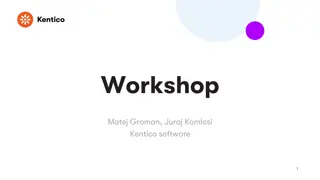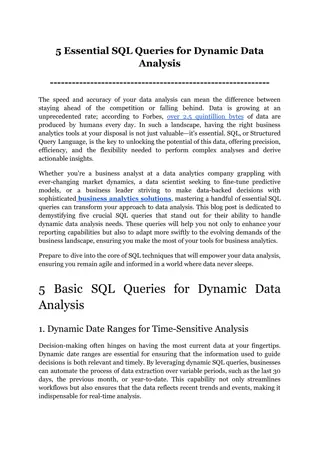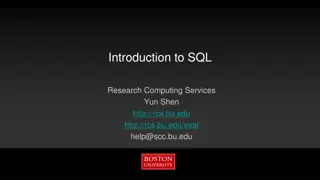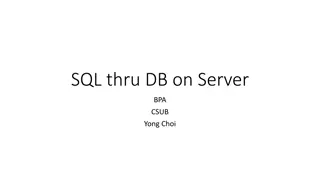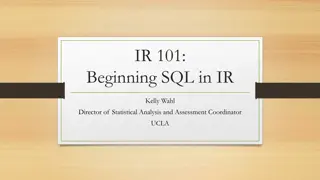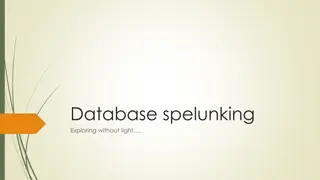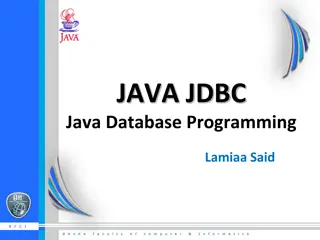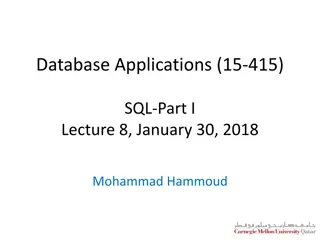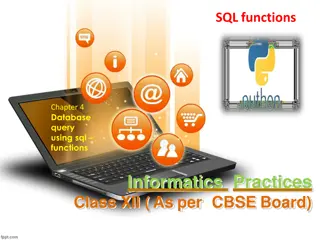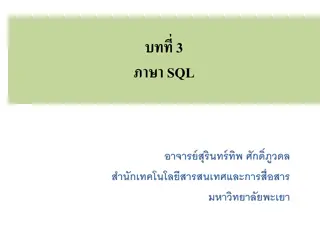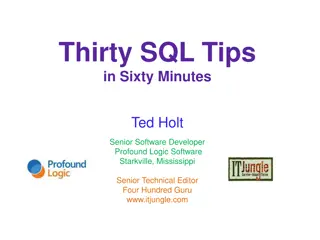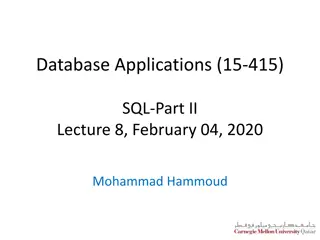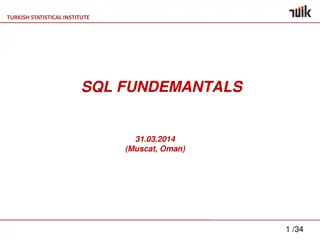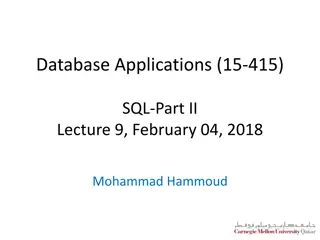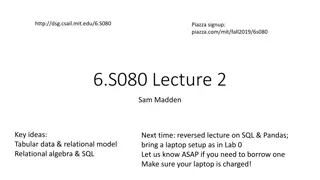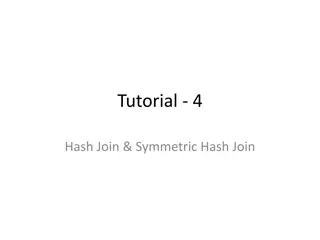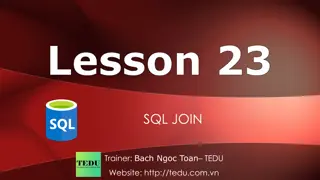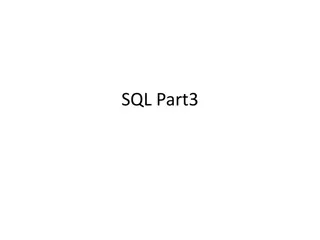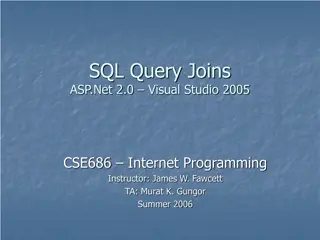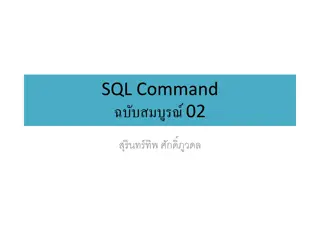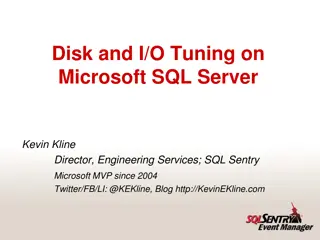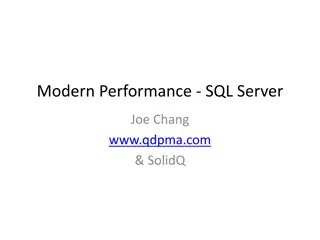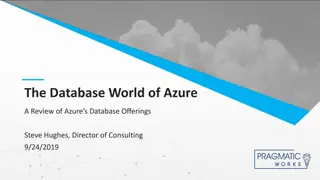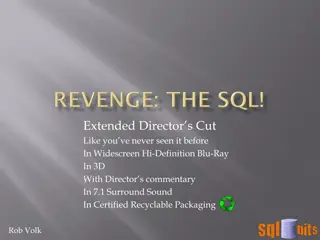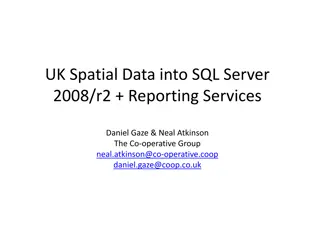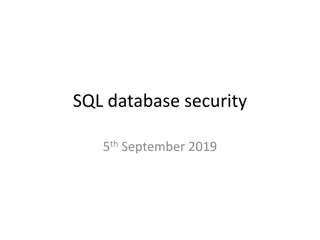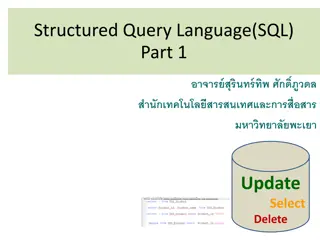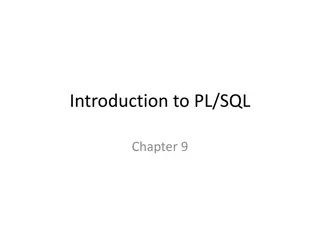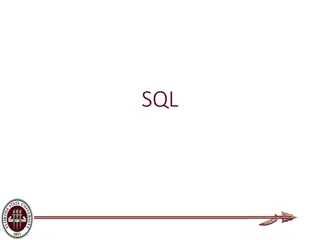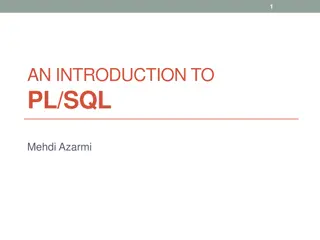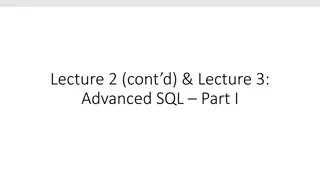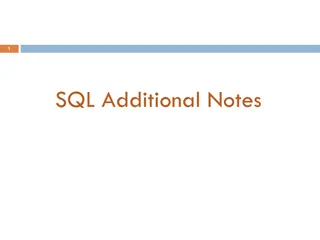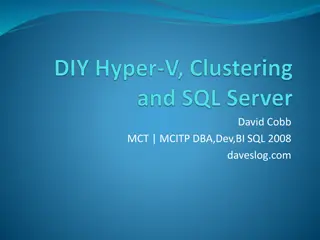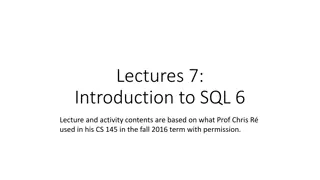Security Breach: Detecting and Exploiting SQL Injection in Contact Groups
Suspect a potential SQL injection in the macros used in Contact groups? Learn how to identify and exploit it through blind SQL injection techniques. Follow step-by-step instructions to execute a payload that alters user data and gain unauthorized access. Stay vigilant and proactively safeguard your
4 views • 27 slides
5 Essential SQL Queries for Dynamic Data Analysis
Explore the transformative power of SQL with our latest guide, which highlights five critical SQL queries essential for dynamic data analysis. This post covers how these queries can be utilized by business analytics tools to enable data analysts, scientists, and BI professionals to extract actionabl
6 views • 8 slides
Different Types of SQL Joins
Explore the various types of SQL joins such as INNER JOIN, LEFT (OUTER) JOIN, RIGHT (OUTER) JOIN, and FULL (OUTER) JOIN. Learn how each type functions and the syntax for implementing them. Get insights into examples of INNER JOIN and LEFT OUTER JOIN operations to enhance your SQL knowledge.
1 views • 26 slides
Learn SQL Basics: History, Syntax, and Terminology
SQL (Structured Query Language) is a specialized domain-specific language for managing structured data in relational databases. Developed in the 1970s, it follows a rigid syntax and structure, with specific features like triggers and stored procedures. Understanding SQL history, terminology, and syn
1 views • 38 slides
SQL Queries for Database Management
Explore a series of SQL queries for efficient database management, including selecting specific records, sorting data, and counting customers by country. Enhance your SQL skills with these practical examples showcasing various query types and techniques.
1 views • 10 slides
Introduction to SQL: Learn the Basics and Beyond
Explore the world of Structured Query Language (SQL) with this comprehensive guide. Discover what SQL is, its history, usage, and how to learn it on your own through free online tutorials. Understand the properties of relational databases and get insights into designing a relational database. With S
0 views • 29 slides
Mastering SQL Server: Tips and Tricks for Efficient Database Exploration
Delve into the world of SQL Server with expert tips on finding instances, listing databases, and searching for tables or columns by name. Discover efficient ways to navigate relational databases using SQL queries, PowerShell, and Management Studio, making database exploration a breeze.
0 views • 14 slides
Introduction to Database Systems and SQL Programming
Understanding database systems is crucial in today's digital world. Explore the basics of database systems, SQL statements, and Java Database Connectivity (JDBC) in this comprehensive overview. Learn about DBMS, SQL querying, JDBC API, and more to enhance your understanding of managing and interacti
10 views • 24 slides
SQL: Major Aspects and Functionality in Database Applications
SQL, as a relational database language, offers Data Manipulation Language (DML) and Data Definition Language (DDL) for querying and modifying data. Additionally, SQL encompasses triggers, embedded code execution, remote database access, transaction management, and security features for efficient dat
1 views • 52 slides
SQL Functions for Database Queries
SQL functions are essential elements in performing actions and obtaining results in a database query. They come in two main types: scalar functions and aggregate functions. Scalar functions operate on single values, while aggregate functions operate on sets of data. Examples of SQL functions include
1 views • 14 slides
Comprehensive Overview of SQL Commands and Language Categories
In this detailed guide, you will learn about Structured Query Language (SQL) including its various commands such as Data Definition Language (DDL), Data Manipulation Language (DML), Data Control Language (DCL), and Transaction Control Language (TCL). Explore how SQL is used in Database Management Sy
0 views • 15 slides
SQL Tips to Enhance Data Sorting Techniques
Gain valuable insights into SQL tips for optimizing data sorting techniques. Learn how to utilize column numbers for efficient sorting, implement non-alphabetic sorting techniques, ignore case in sorts and comparisons, and access data in arrival sequence using the RRN function. These tips are design
0 views • 44 slides
SQL Queries and Joins in Database Applications Lecture
Discover a comprehensive overview of SQL queries, including nested and deeply nested queries, in the context of database applications. Learn about joining tables, finding sailors who reserved specific boats, handling NULL values, and more in this informative lecture featuring examples and explanatio
0 views • 53 slides
Turkish Statistical Institute SQL Fundamentals Overview
The Turkish Statistical Institute provides an in-depth look at SQL fundamentals covering main categories, basic SQL commands, set operations, aggregate functions, join operations, and more. SQL, or Structured Query Language, is a special-purpose programming language designed for managing data in RDB
0 views • 33 slides
SQL Part II Lecture Summary: Nested Queries, Joins, and Updates for Database Applications
In this SQL lecture, Mohammad Hammoud covers nested queries, insertion, deletion, updates, handling NULL values, join variants, and advanced query techniques. Examples include finding sailors who have reserved specific boats, using nested queries to filter data, and deep nested queries for complex d
0 views • 53 slides
Introduction to Tabular Data Modeling and SQL Concepts
Explore the fundamentals of tabular data modeling, relational algebra, SQL, and database relationships through practical examples. Learn about key concepts such as primary keys, tuples, and different types of relationships in database management. Get hands-on experience using Pandas and SQL for data
1 views • 30 slides
Joins, Views, and Subqueries in SQL
This informative guide delves into the essentials of joining, viewing, and utilizing subqueries in SQL. Explore multi-table selects, various join types, and examples of inner, left outer, and right outer joins, offering a clear understanding of how to manipulate and combine data in SQL queries effec
0 views • 28 slides
Table Joins in SQL
Exploring various types of table joins in SQL, including Cross Join, Inner Join, Outer Join, and Self Join. Learn how these joins work, when to use them, and see practical examples for better comprehension.
0 views • 22 slides
Hash Joins and Symmetric Hash Joins in Database Queries
Hash joins and symmetric hash joins are key techniques used in database queries to efficiently access and combine data from multiple tables. Hash joins load candidate records into hash tables for quick probing, while symmetric hash joins maintain two hash tables with two hash functions. Despite thei
0 views • 8 slides
SQL JOIN: A Comprehensive Guide
SQL JOIN allows you to merge data from multiple tables in a database, enabling you to access information more efficiently. This comprehensive guide covers the types of JOIN operations available in SQL, such as INNER JOIN, LEFT JOIN, RIGHT JOIN, and FULL JOIN, along with their purposes and practical
0 views • 6 slides
SQL Query Optimization Techniques
Learn advanced SQL techniques including subqueries, inserts, updates, joins, and data manipulation to enhance the performance of your database queries efficiently.
0 views • 18 slides
Joins in DBMS: Types and Operations
Joins in DBMS are binary operations that allow you to combine data from multiple tables using primary and foreign keys. There are two main types of joins: Inner Joins (Theta, Natural, EQUI) and Outer Joins (Left, Right, Full). Inner joins help merge data from tables based on specified conditions, wh
0 views • 16 slides
SQL Joins in ASP.Net 2.0 with Visual Studio 2005
Exploring the importance of query joins in SQL, this instructional content delves into inner, outer, left outer, and right outer joins for integrating data from multiple database tables in ASP.Net 2.0. Detailed guidance is provided on setting up SQL databases in Visual Studio .NET 2005, creating tab
0 views • 11 slides
Overview of Different Types of SQL Joins
Examine the various types of SQL joins including INNER JOIN, LEFT JOIN, RIGHT JOIN, and FULL JOIN. Understand the differences between these join types and how they retrieve data from multiple tables based on specified conditions. Explore practical examples of joining tables and creating relationship
0 views • 18 slides
Disk and I/O Tuning on Microsoft SQL Server by Kevin Kline
Explore disk and I/O tuning best practices for Microsoft SQL Server with insights from Kevin Kline, covering fundamentals of disk hardware architecture, disk sector alignment issues, performance impacts, and the emergence of SSD technology. Discover key strategies and resources for optimizing disk a
0 views • 34 slides
Modern Performance in SQL Server
Explore the evolution of performance in SQL Server with insights from Joe Chang, a seasoned SQL Server consultant. Delve into topics like query optimization, execution plans, CPU and memory advancements, storage technologies, and the significance of performance in today's data environment. Discover
0 views • 40 slides
The World of Azure Database Offerings
Exploring Azure's database offerings including Azure Cosmos DB and Azure SQL Database. Azure Cosmos DB provides a globally scalable document database solution, while Azure SQL Database is a great option for SQL Server workloads. Both platforms offer unique features such as low latency, scalability,
1 views • 15 slides
Unorthodox SQL Techniques Unleashed: REVENGE: The SQL
Explore the unconventional realm of SQL with Rob Volk as he delves into extreme methodologies for manipulating data. From revenge-driven practices to extreme server admin tricks, this session is a wild ride through unparalleled SQL strategies.
0 views • 16 slides
SQL Server Polybase: Data Virtualization Overview
Learn about SQL Server Polybase, a data virtualization feature that allows distributed query processing and data virtualization across various sources such as HDFS, Cosmos DB, and more. Discover how to use Polybase to build a data hub within SQL Server, enabling efficient query performance and analy
0 views • 20 slides
Utilizing UK Spatial Data in SQL Server 2008 R2 Reporting Services
Explore how to display UK geospatial data in SQL Server 2008 R2 Reporting Services by finding and importing Ordnance Survey Open Data. Learn how to represent the UK on a map, import data into SQL, and create example reports. Discover limitations and resources to kickstart your spatial data journey i
0 views • 7 slides
SQL Database Security Best Practices
Understanding SQL database security is crucial for protecting your web service from vulnerabilities. This article covers topics such as access control, injection attacks, privileges management, and best practices for securing your SQL server effectively.
0 views • 16 slides
Comprehensive Overview of SQL: Commands and Categories
Explore the world of Structured Query Language (SQL) through this detailed guide covering SQL categories, command classifications (DDL, DML, DCL, TCL), data manipulation and control languages, and transaction control language. Learn about creating, altering, and dropping database objects, data retri
0 views • 14 slides
PL/SQL Benefits and Objectives
Explore the advantages of PL/SQL such as integration of procedural constructs with SQL, improved performance, and efficient exception handling. Learn about the objectives of PL/SQL, types of PL/SQL blocks, and using Oracle SQL Developer for development. Gain insights into the structure of PL/SQL blo
0 views • 42 slides
Exception Handling in PL/SQL
Learn about handling exceptions in PL/SQL, understanding the block structure, different types of exceptions including system, named, unnamed, and user-defined exceptions. Explore how to explicitly handle exceptions in PL/SQL blocks with examples showcasing error handling scenarios like division by z
0 views • 18 slides
SQL - Introduction and Basics
SQL (Structured Query Language) is a standard language for querying and manipulating data. It includes Data Definition Language (DDL) for creating, altering, and deleting tables, Data Manipulation Language (DML) for querying tables and modifying data, and more. Tables in SQL consist of attributes li
0 views • 30 slides
Introduction to PL/SQL: Oracle's Procedural Language Extension
PL/SQL is Oracle's extension to SQL, combining the power of SQL with the procedural constructs of a 3GL. This introduction covers the basics of PL/SQL blocks, block structure, variables and types, executable sections, and example variable declarations. It also highlights the features such as error h
1 views • 29 slides
Advanced SQL Concepts and Queries Overview
Today's lecture highlights advanced SQL topics such as multi-table queries, set operators, joins, primary keys, foreign keys, and more. The session covers practical activities and fundamental concepts in database management. Explore the nuances of SQL semantics and understand the importance of keys
0 views • 55 slides
SQL Advanced Concepts Overview
This content covers various advanced SQL concepts such as Grouping and Aggregation, Execution Order, Joins, Maximum Finding, and Line Formatting. It provides examples and explanations on how to use these concepts effectively in SQL queries. The visual aids help in understanding the concepts better.
0 views • 17 slides
Active/Active SQL Clusters for High Availability
Discover the importance of Active/Active SQL clusters for ensuring 24/7 availability of your database servers. Learn about the benefits, setup process, and the high availability solution it offers for the entire server instance. Follow a detailed step-by-step guide for setting up SQL Active/Active c
1 views • 18 slides
SQL Concepts: Quantifiers, NULLs, and Handling Null Values
Dive into the world of SQL with this content, covering essential concepts such as quantifiers, NULLs, and how SQL handles null values. Explore topics like existential and universal quantifiers, handling NULL values in numerical and boolean operations, and understanding the behavior of NULL values in
0 views • 18 slides
